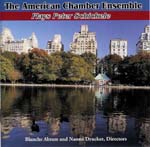[Peter Schickele is best known as the delightfully clever musical humorist, promoter, presenter, and curator of the works of PDQ Bach, the “last and least” of Johann Sebastian’s children. But he also was a more or less serious composer whose works are available on several recordings, including this one, which we offer as a repost from our archives, in memory and tribute following Schickele’s death on January 16, 2024.]
This is a sparkling, fun disc of chamber music by Peter Schickele. I probably wouldn’t have to tell you that Schickele is best known for his comic concerts featuring his own uproarious musical parodies credited (if that is the right word) to the mythical P.D.Q. Bach, except that Schickele brings in a tune from a P.D.Q. piece (Oedipus Tex) as the subject in variations that close the first work on the disc, Serenade for Three, for clarinet, violin, and piano: A cowboy-like theme from the oratorio Oedipus Tex is the basis for the rollicking Variations that constitute the final movement. The opening Dances features a blues rhythm in the piano. The rather sad middle movement, “Songs”, has creative and effective use of unisons between the clarinet and the violin in unusually soft dynamics. The barrel-house conclusion of the Variations is as humorous as we could wish from the creator of P.D.Q.
A Quartet and an Octet are the two most formal compositions on the disc, but in mood, they are anything but. Generally loose and easy-going, these pieces have instrumentation inspired by great chamber masterpieces–the Schubert Octet and the Messiaen Quartet for the End of Time. But the mood of the pieces is different. The sounds are never thick and unison and octave-doubled texture are the most common. Schickele’s truly fine melodic gift, therefore, never has to fight harmonic clutter. Both these chamber works have slow movements full of gentle lyric beauties, and when Schickele gets to faster movements he usually employs various types of popular or international folk rhythms. The most unusual composition on the disc is Monochrome III for nine clarinets. Jazz elements frequently occur, and Schickele delights in the variety of sound combinations he can draw from nine identical instruments.
I suspect that there are things in this music that are harder to play than the untroubled sound of these pieces might suggest. For instance, I noticed a unison between pizzicato strings and rather high staccato notes on French horn that must be a real bear to play in the perfect ensemble heard on this disc.
The American Chamber Ensemble has a fine reputation in New York and on disc, well earned. It shows fresh evidence of the reason why in performances that are always beautiful-sounding and full of good humor. Monochrome III has its own group of nine New York single-reed all-stars headed by Stanley Drucker. The predominant instrumenalist otherwise is clarinetist and American Chamber Ensemble co-director Naomi Drucker who has a part in all the remaining three pieces, but the credits make it hard to ascertain who the violinist and pianist are in the trio and the quartet. They are all first-rate.
The sound is very realistic and clear, presenting a convincing impression of a good recital hall stage: Intimate without being too forward or at all boxy. If you appreciate music that can have substance without storm and stress, go for this first-rate release. If you think that classical music has to have tragedy and struggle, you probably think this is not for you. Try it anyway. Odds are you’ll like it.
































